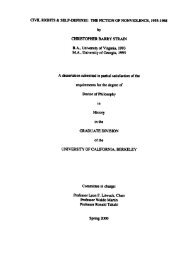Negro Digest - Freedom Archives
Negro Digest - Freedom Archives
Negro Digest - Freedom Archives
Create successful ePaper yourself
Turn your PDF publications into a flip-book with our unique Google optimized e-Paper software.
ment of a plan to hire 200 Black<br />
professors by Fall 1969 ) .<br />
Last, there is the problem of<br />
definition . If Lyndon Johnson<br />
could co-opt the civil rights thrust<br />
deceitfully smiling as he proclaimed,<br />
"We shall overcome,"<br />
then Black people ought to watch<br />
out . If the United <strong>Negro</strong> College<br />
Fund could place an ad in the New<br />
York Times portraying a <strong>Negro</strong> in<br />
cap and gown with the caption,<br />
"Black Power," then Black people<br />
ought to watch out . But, normally,<br />
colonial forces are the first to move<br />
in on ideological concepts (Note<br />
the emasculated verison of the class<br />
conflict as compared to what Karl<br />
Marx meant in the Manifesto)<br />
. . . Only after a few foundation<br />
grants and a few conferences for<br />
whites is it normally possible for<br />
<strong>Negro</strong>es to use the term-and then<br />
it is often psychologically difficult<br />
for them to say it without perjorative<br />
gesticulations .<br />
Terminological cooptation is a<br />
process to confuse the ideological<br />
struggle for popular support . We<br />
must always be aware of the need<br />
for clarity and we must never hesitate<br />
to provide an understandable<br />
analysis for any group of our people<br />
. And now, having looked at the<br />
dangers, we ought to examine the<br />
positive ideological basis for our<br />
struggle .<br />
(4) Ideological Guidelines for<br />
Struggle<br />
There are five ideological guidelines<br />
that fit these discussions,<br />
though it is in the course of strug-<br />
NEGRO DIGEST March 1969<br />
gle itself that we will define what<br />
is ultimately necessary for our liberation<br />
. These must be as free as<br />
possible of the above listed dangers<br />
.<br />
(A ) African identity: No other<br />
identification is as close to our history<br />
and as far from our oppressors<br />
. The term "Afro-American"<br />
still somehow legitimates the hell of<br />
America and separates us through<br />
generations from Africa. Our identity<br />
as Africans is based on the<br />
utility it has for struggle . Only by<br />
recognizing the alien character of<br />
this country (even though it is<br />
sometimes tolerable because of our<br />
contribut; ns to it) can we ever<br />
hope to successfully wage the revolutionary<br />
struggle .<br />
(B) Operational Unity : While<br />
it is obvious that one all-inclusive<br />
organization for Black people<br />
would be impossible to build, it is<br />
not impossible to move toward<br />
coalitions of groups . Most national<br />
liberation struggles have been<br />
based on the operational unity of<br />
a diverse set of organizations . And<br />
we can see moves in this direction<br />
with the Black Congress in Los<br />
Angeles, the United Black Front in<br />
Washington, D. C., the Black Congress<br />
in Chicago, and the attempt<br />
to build a Black People's Alliance<br />
in Atlanta. We must work cooperatively<br />
on common goals in order to<br />
utilize all resources, and "for their<br />
thousand blows deal one death<br />
blow ."<br />
(Continued on page 89)<br />
2 1
















